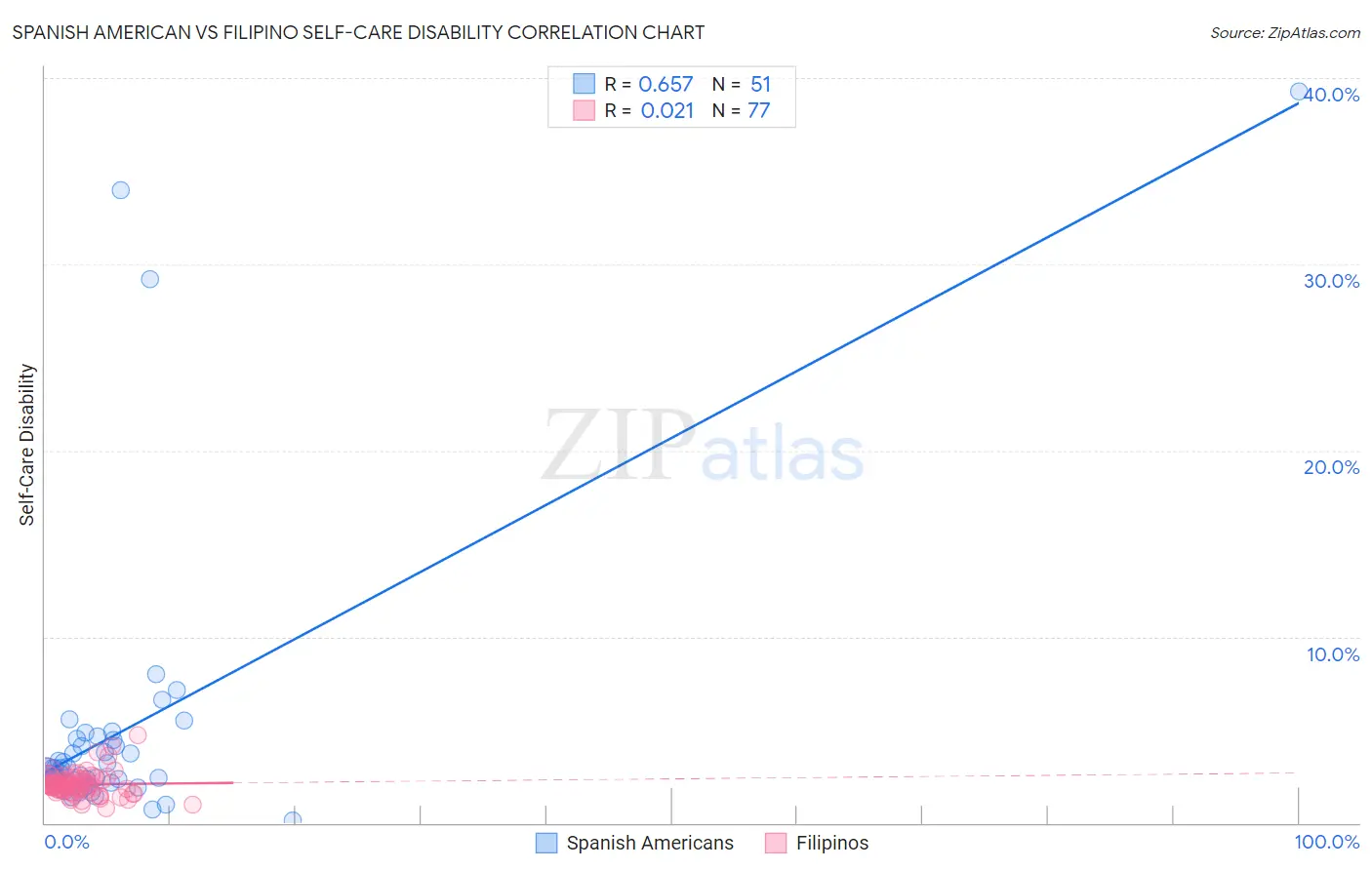Spanish American vs Filipino Self-Care Disability
COMPARE
Spanish American
Filipino
Self-Care Disability
Self-Care Disability Comparison
Spanish Americans
Filipinos
2.8%
SELF-CARE DISABILITY
0.0/ 100
METRIC RATING
313th/ 347
METRIC RANK
2.2%
SELF-CARE DISABILITY
100.0/ 100
METRIC RATING
6th/ 347
METRIC RANK
Spanish American vs Filipino Self-Care Disability Correlation Chart
The statistical analysis conducted on geographies consisting of 103,142,959 people shows a significant positive correlation between the proportion of Spanish Americans and percentage of population with self-care disability in the United States with a correlation coefficient (R) of 0.657 and weighted average of 2.8%. Similarly, the statistical analysis conducted on geographies consisting of 254,069,032 people shows no correlation between the proportion of Filipinos and percentage of population with self-care disability in the United States with a correlation coefficient (R) of 0.021 and weighted average of 2.2%, a difference of 31.3%.

Self-Care Disability Correlation Summary
| Measurement | Spanish American | Filipino |
| Minimum | 0.12% | 0.79% |
| Maximum | 39.3% | 4.7% |
| Range | 39.1% | 3.9% |
| Mean | 4.9% | 2.1% |
| Median | 2.9% | 2.0% |
| Interquartile 25% (IQ1) | 2.2% | 1.8% |
| Interquartile 75% (IQ3) | 4.4% | 2.3% |
| Interquartile Range (IQR) | 2.3% | 0.54% |
| Standard Deviation (Sample) | 7.6% | 0.64% |
| Standard Deviation (Population) | 7.5% | 0.64% |
Similar Demographics by Self-Care Disability
Demographics Similar to Spanish Americans by Self-Care Disability
In terms of self-care disability, the demographic groups most similar to Spanish Americans are Immigrants from Caribbean (2.8%, a difference of 0.030%), Creek (2.8%, a difference of 0.22%), Puget Sound Salish (2.8%, a difference of 0.23%), British West Indian (2.8%, a difference of 0.30%), and Bangladeshi (2.8%, a difference of 0.40%).
| Demographics | Rating | Rank | Self-Care Disability |
| Aleuts | 0.0 /100 | #306 | Tragic 2.8% |
| Natives/Alaskans | 0.0 /100 | #307 | Tragic 2.8% |
| Immigrants | Grenada | 0.0 /100 | #308 | Tragic 2.8% |
| Bangladeshis | 0.0 /100 | #309 | Tragic 2.8% |
| British West Indians | 0.0 /100 | #310 | Tragic 2.8% |
| Puget Sound Salish | 0.0 /100 | #311 | Tragic 2.8% |
| Immigrants | Caribbean | 0.0 /100 | #312 | Tragic 2.8% |
| Spanish Americans | 0.0 /100 | #313 | Tragic 2.8% |
| Creek | 0.0 /100 | #314 | Tragic 2.8% |
| Immigrants | Cuba | 0.0 /100 | #315 | Tragic 2.8% |
| Menominee | 0.0 /100 | #316 | Tragic 2.8% |
| Immigrants | Dominica | 0.0 /100 | #317 | Tragic 2.8% |
| Assyrians/Chaldeans/Syriacs | 0.0 /100 | #318 | Tragic 2.8% |
| Spanish American Indians | 0.0 /100 | #319 | Tragic 2.9% |
| Chickasaw | 0.0 /100 | #320 | Tragic 2.9% |
Demographics Similar to Filipinos by Self-Care Disability
In terms of self-care disability, the demographic groups most similar to Filipinos are Immigrants from Bolivia (2.2%, a difference of 0.21%), Zimbabwean (2.2%, a difference of 0.25%), Bolivian (2.2%, a difference of 0.26%), Immigrants from Nepal (2.2%, a difference of 0.39%), and Immigrants from Singapore (2.1%, a difference of 1.2%).
| Demographics | Rating | Rank | Self-Care Disability |
| Yup'ik | 100.0 /100 | #1 | Exceptional 1.9% |
| Immigrants | India | 100.0 /100 | #2 | Exceptional 2.0% |
| Thais | 100.0 /100 | #3 | Exceptional 2.1% |
| Immigrants | Singapore | 100.0 /100 | #4 | Exceptional 2.1% |
| Zimbabweans | 100.0 /100 | #5 | Exceptional 2.2% |
| Filipinos | 100.0 /100 | #6 | Exceptional 2.2% |
| Immigrants | Bolivia | 100.0 /100 | #7 | Exceptional 2.2% |
| Bolivians | 100.0 /100 | #8 | Exceptional 2.2% |
| Immigrants | Nepal | 100.0 /100 | #9 | Exceptional 2.2% |
| Sudanese | 100.0 /100 | #10 | Exceptional 2.2% |
| Immigrants | South Central Asia | 100.0 /100 | #11 | Exceptional 2.2% |
| Immigrants | Ethiopia | 100.0 /100 | #12 | Exceptional 2.2% |
| Ethiopians | 100.0 /100 | #13 | Exceptional 2.2% |
| Luxembourgers | 100.0 /100 | #14 | Exceptional 2.2% |
| Okinawans | 100.0 /100 | #15 | Exceptional 2.2% |